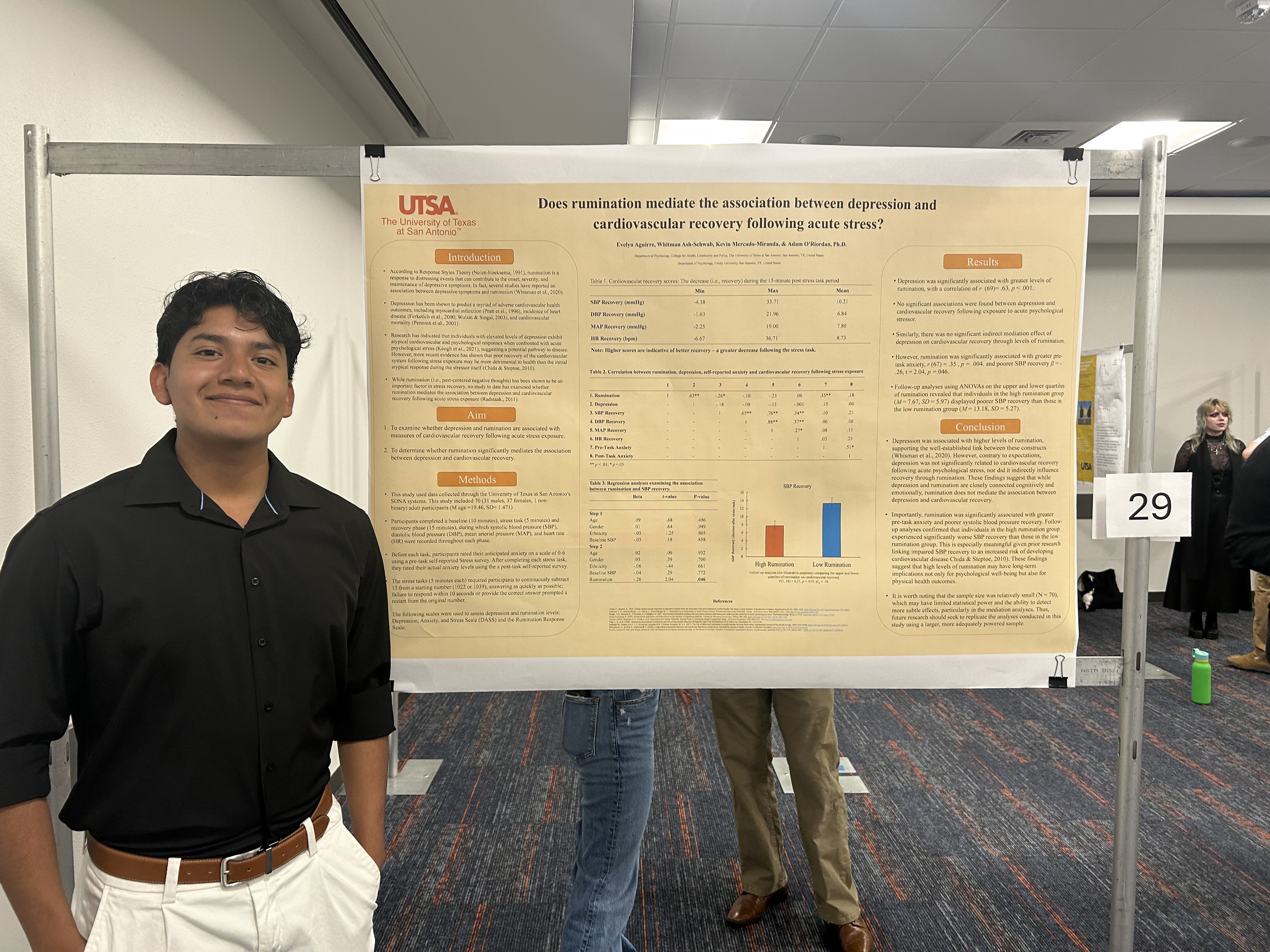Our research publications explore the complex intersections of stress and psychosocial factors, uncovering how the body and mind respond to challenges that reflect real-world pressures.
By exposing participants to acute, life-like stressors, our studies capture genuine physiological reactions that reveal the nuanced ways in which stress impacts health and well-being. The findings presented here contribute to a deeper understanding of stress responses, with implications for improving resilience, mental health, and overall quality of life across diverse communities.


Selected publications
Objective: The current study aims to (1) examine the association between measures of trait anger (i.e., anger temperament and anger reaction) and cardiovascular reactivity to acute psychological stress, and (2) to identify if anger expression styles moderate the association between trait anger and cardiovascular reactivity.
Methods: A sample of 669 participants completed a standardized cardiovascular reactivity protocol consisting of resting baseline and stressor phase (mental arithmetic and Stroop), with systolic blood pressure (SBP), diastolic blood pressure (DBP) and heart rate (HR) monitored throughout. Participants also completed measures of trait anger including anger temperament and anger reaction, as well as measures assessing anger expression styles including anger-in, anger-out and anger control.
Results: Anger temperament was significantly associated with blunted cardiovascular reactivity, as well as increased levels of subjective stress. Moreover, the association between anger temperament and cardiovascular reactivity was significantly moderated by anger-in, with associations observed only amongst those who reported an increased tendency to suppress their anger. The association between anger reaction and cardiovascular reactivity was moderated by both anger-out and anger control.
Conclusion: While blunted cardiovascular responses may be a mechanism linking facets of trait anger to adverse health outcomes, the current findings accentuate the importance of considering expression styles when examining the association between anger experience and cardiovascular reactivity.
Novel research demonstrates that lower or ‘blunted’ cardiovascular reactions to stress are associated with a range of adverse outcomes. The aim of the current review was (1) to examine the prospective outcomes predicted by blunted cardiovascular reactivity and (2) to identify a range of blunted cardiovascular reaction levels that predict these outcomes. Electronic databases were systematically searched (Medline, PsycArticles, PsycInfo, CINAHL, PubMed, Web of Science). Studies were included if they examined the prospective influence of blunted cardiovascular reactivity to psychological stress (SBP, DBP or HR) on a negative health, behavioural or psychological outcome. A total of 23 studies were included in the review. Blunted reactivity predicted (1) adverse cardiovascular health, primarily in cardiac samples (e.g., myocardial infarction, carotid atherosclerosis) and (2) outcomes associated with motivational and behavioural dysregulation in healthy samples (e.g., obesity, smoking addiction, depression). The cardiovascular reactivity threshold levels that were predictive of adverse health outcomes ranged between −3.00–12.59 bpm (14.41% to 136.59% lower than the sample mean) and −2.4–5.00 mmhg (65.99% to 133.80% lower than sample mean), for HR and DBP respectively. We posit that blunted reactions lower than, or equal to, the ranges reported here may be utilised by clinicians and researchers to identify individuals who are at increased risk of adverse cardiovascular health outcomes, as well as outcomes associated with motivational and behavioural dysregulation.
O'Riordan, A., Young, D. A., Tyra, A. T., & Ginty, A. T. (2023). Extraversion is associated with lower cardiovascular reactivity to acute psychological stress. International Journal of Psychophysiology, 189, 20-29.
Background and aims: Extraversion has been associated with positive physical health outcomes, with adaptive cardiovascular responses to stress being one potential physiological mechanism. The present study examined the influence of extraversion on both cardiovascular reactivity and cardiovascular habituation to an acute psychological stress task (Paced Auditory Serial Addition Test (PASAT)) in a sample of healthy undergraduate students.
Methods: A sample of 467 undergraduate students completed the Big Five Inventory (BFI) to assess trait extraversion and attended a single stress testing session. The testing session included two identical stress-testing protocols, each consisting of a 10-minute baseline and 4-minute PASAT. Cardiovascular parameters including heart rate (HR), systolic/diastolic blood pressure (S/DBP) and mean arterial pressure (MAP) were recorded throughout the testing session. State measures of positive affect (PA) and negative affect (NA), as well as post task measures of self-reported stress were used to assess psychological experiences of the stress task.
Results: Extraversion was significantly associated with lower self-reported stress in response to the initial stress exposure, but not the second stress exposure. Higher levels of extraversion were associated with lower SBP, DBP, MAP and HR reactivity in responses to both exposures to the stressor. However, no significant associations were observed between extraversion and cardiovascular habituation to recurring psychological stress.
Conclusion: Extraversion is associated with lower cardiovascular reactivity to acute psychological stress and this relationship persists upon repeated exposures to the same stressor. Cardiovascular responses to stress may indicate a potential mechanism facilitating the association between extraversion and positive physical health outcomes.
O'Riordan, A., Gallagher, S., & Howard, S. (2023). Type D personality and cardiovascular reactivity to acute psychological stress: A systematic review and meta-analysis. Health Psychology, 42(9), 628.
Objectives: Type D personality has been associated with adverse cardiovascular health, with atypical cardiovascular reactions to psychological stress considered a possible mechanism of effect. However, studies examining Type D personality and cardiovascular reactions to acute stress have yielded mixed findings. Here, we conducted a systematic review and meta-analyses to examine if, and under what conditions, Type D personality is associated with cardiovascular reactivity to stress; a particular focus was placed on sex and the social salience of the stressor as potential moderators of effects.
Method: Electronic databases (Medline, PsycArticles, PsycInfo, CINAHL, PubMed, Web of Science) were searched for relevant publications. A total of 401 articles were retrieved and screened for eligibility. Inclusion criteria included studies with nonclinical samples employing a resting baseline period followed by a psychological stress task period and measurement of cardiovascular reactivity. Following screening and removal of irrelevant articles, 17 peer-reviewed studies were included in the review.
Result: Type D personality was associated with lower blood pressure reactivity to acute psychological stress. Subgroup analyses revealed an association between Type D personality and lower cardiovascular reactivity among females, but not males. Additionally, Type D personality was primarily associated with lower cardiovascular reactivity in response to nonsocial stressors.
Conclusions: Type D personality is associated with lower blood pressure reactivity to acute psychological stress, particularly among females and in response to nonsocial stressors. This lower response may be indicative of blunted cardiovascular reactivity and therefore signals an increased risk of adverse health outcomes.
O’Riordan, A., Young, D. A., & Ginty, A. T. (2023). Disordered eating is associated with blunted blood pressure reactivity and poorer habituation to acute psychological stress. Biological Psychology, 179, 108553.
Psychological stress has been shown to influence the development and progression of disordered eating. Psychophysiological studies have reported that individuals with disordered eating behavior exhibit atypical cardiovascular reactions to acute psychological stress. However, prior studies have been limited by small sample sizes and have examined cardiovascular responses to a singular stress exposure. The current study examined the association between disordered eating and cardiovascular reactivity, as well as cardiovascular habituation to acute psychological stress. A mixed-sex sample (N = 450) of undergraduate students were categorized into a disordered eating or non-disordered eating group using a validated disordered eating screening questionnaire and attended a laboratory stress testing session. The testing session included two identical stress-testing protocols, each consisting of a 10-minute baseline and 4-minute stress task. Cardiovascular parameters including heart rate, systolic/diastolic blood pressure and mean arterial pressure (MAP) were recorded throughout the testing session. Post task measures of self-reported stress, as well as positive affect and negative affect (NA) reactivity were used to assess psychological reactions to stress. The disordered eating group exhibited greater increases in NA reactivity in response to both stress exposures. Additionally, in comparison to the control group, those in the disordered eating group exhibited blunted MAP reactivity to the initial stress exposure and less MAP habituation across both stress exposures. These findings indicate that disordered eating is characterized by dysregulated hemodynamic stress responsivity, which may constitute a physiological mechanism leading to poor physical health outcomes.

